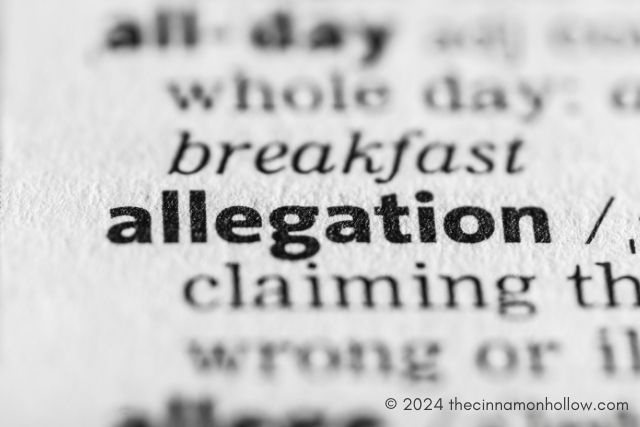Life has a way of throwing unexpected challenges our way, and one of the most daunting ones is being falsely accused. Whether it’s a criminal charge, allegations of sexual assault, or claims of domestic violence, the weight of false accusations can be overwhelming. Sometimes, you just want to leave these things behind and move on. But there are reasons why it’s absolutely crucial to take immediate action.

Legal Consequences of Being Falsely Accused
Perhaps the most daunting aspect of false accusations is the legal battle that follows. Legal proceedings can be complex and emotionally draining, requiring time, resources, and a steadfast commitment to proving your innocence. The consequences of false accusations can range from legal fees and court appearances to the potential loss of employment and damage to personal relationships.
But a false allegation like being publicly accused of domestic violence by someone you love can be so complicated. They may not charge you to court, but your reputation may be fundamentally damaged. Your friends may form new opinions of you. You may even be fired from work and denied job opportunities.
You know you are innocent, but no one else is. Rather than leave things to fate, seek a defense attorney and take immediate legal action. Reputable criminal defense attorneys like Kevin A. Raudt, P.A. are known to protect the rights of the criminally accused, and you’ll want such a professional by your side if you must save your name.
Taking immediate action in the face of false accusations is not just a suggestion – it’s a necessity. Engaging a skilled attorney who specializes in the relevant area of law is your first line of defense. Swift action can lead to a faster resolution and help minimize the repercussions that may linger if left unaddressed.
The Emotional Turmoil
Aside from the legal aspect, let’s acknowledge the emotional rollercoaster that false accusations unleash. Being falsely accused of a crime or misconduct can be emotionally devastating. Feelings of shock, disbelief, anger, and betrayal can hit you like a tidal wave. It’s perfectly okay to feel a mix of emotions – they are part of the human experience.
Imagine waking up one day to find yourself at the center of an accusation that you know is untrue. Your world gets turned upside down, and the trust you once had in your relationships and society can feel shattered. This can lead to anxiety, depression, or post-traumatic stress disorder (PTSD), common consequences for individuals facing false accusations. The relentless worry about the future, the fear of judgment, and the strain of the legal battle can take a severe toll on mental well-being.
Seeking professional mental health support is not a sign of weakness but a courageous step towards healing. Therapists and counselors can provide the tools needed to cope with the emotional aftermath of false allegations and help rebuild your mental resilience.
Strained Relationships
False accusations can strain even the strongest of relationships. Whether it’s with a partner, family member, or close friend, the weight of suspicion can create a rift that’s challenging to bridge. It’s essential to communicate openly and honestly with those who matter to you, sharing your side of the story and seeking understanding.
Rebuilding trust takes time, patience, and a commitment to nurturing healthy relationships. You’ll want to surround yourself with a support system that believes in your innocence, as this can help weather the storm of false allegations.
The Importance of Swift Action
Time is of the essence when faced with false allegations. The longer you wait to address the situation, the deeper the consequences can become. Immediate action involves:
- Seeking Legal Counsel: Engage a lawyer who specializes in the relevant area of law to guide you through the legal process. Swift action can influence the trajectory of legal proceedings.
- Gathering Evidence: Collect any evidence that can substantiate your innocence. This may include text messages, emails, or any other documentation that can refute the false claims.
- Open Communication: Be proactive in communicating with those close to you. Share your side of the story, address concerns, and seek support from friends and family.
- Mental Health Support: Reach out to mental health professionals who can provide guidance and support during this challenging time.
Moving Forward
Facing false allegations is undoubtedly one of life’s most daunting challenges. In the face of false allegations, taking control of your narrative, seeking the right help, and facing the challenges head-on can be the key to reclaiming your life and moving forward.
Remember, you are not alone, and there are resources available to help you emerge from this challenging chapter stronger and wiser. Stay strong, and remember, the truth has a powerful way of prevailing in the end.
We are not lawyers and this is in no way intended to be used as legal advice . We cannot be held responsible for your results. Always do your own research and seek professional legal help.





